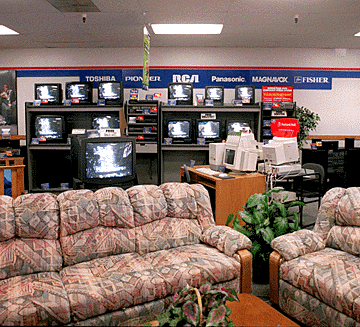

By Kevin Hand, Star-Bulletin
The rent-to-own industry says it gives
consumers a choice, but opponents
say it's too costly
By Peter WagnerStar-Bulletin



She's been paying $22.49 a week for about a year on a bedroom set.
"I'm almost done," said the Honolulu mother of four, whose 57-week agreement will total $1,281.93.
Bali knows she's paying a high price for her set - a dresser, end tables and chest. But, lacking cash or credit, it was the only way she could get furnishings.
"I think it's worth it," she said. "It's more expensive, but it's a way to get what you want if you don't have a large amount for a down-payment."
Rent-A-Center, which operates 12 of the 21 "rent-to-own" stores in Hawaii, offers new and used color TVS, VCRs, stereos, pagers, fax machines, fancy furniture, appliances, an electronic keyboard, a portable bar, jewelry and other amenities for rent or sale.
If you're looking to rent a heavy-duty lawn mulcher, cement drill, or party table for a day or two, you're in the wrong place. Rent-to-own stores deal in high-end household goods with the option to buy - at a high price.
Customers, often transient or without cash or credit, are attracted by the low payments and lack of a credit check. For a nominal processing fee - $10 at Rent-A-Center - and a first payment, you're out the door with your prize.
But take a close look at the terms. That $200 TV set you're paying $10 a week for might seem like a great deal, but 78 weeks later, you've laid out $780. And until the last payment is made, you have neither equity nor ownership. If for some reason the item is repossessed, you lose your payments.
Rent-A-Center, owned by the British conglomerate Thorn PLC, is the biggest rent-to-own company in the United States. The chain is part of a $4.5 billion-a-year industry with more than 8,000 stores nationwide.

Rental agreements generally spell out low weekly or monthly payments with an option to buy at the end of the term.
At Rent-A-Center's McCully store, a 32-inch RCA color TV was recently offered at $24.99 a week for 100 weeks. That comes to $2,499 - nearly triple the $849 asked for a 32-inch RCA TV at Sears down the street. The store's 40 percent-off cash option still put the TV at a considerably higher $1,499.
Markups are similar at Canyon. The company's Kalihi store recently displayed a used Whirlpool 20-cubic-foot refrigerator marked at $99.95 a month, for 21 months. The total price, $2,098, more than doubled the $1,029 retail price of a new model at Sears.
"It's not for everybody," said Brad Denison, assistant general counsel at Thorn Americas Inc., the Wichita, Kansas-based parent company of the Rent-A-Center chain. "We don't pretend that it is."
Winn said 75 percent of rent-to-own transactions are short-term, with customers returning merchandise in three to four months. Some, like military families, are looking for temporary furnishings. Others, he said, live from paycheck to paycheck.
But the booming rent-to-own business has found a solid market where banks and credit card companies have tightened standards.
"It makes sense for a lot of people or we wouldn't have 1,400 stores," Denison said.
Often found in low-income neighborhoods, the business has come under heavy criticism by consumer groups who say it takes advantage of the poor.
"The industry claims to give you the American dream," said Ed Mierzwinski, consumer program director for the U.S. Public Interest Research Group in Washington, D.C. "They claim even if you can't afford it they provide it. They provide it at price that is too hard to pay."
Industry officials acknowledge that many customers are living from paycheck to paycheck and end up returning goods after several months. But customers know what they're getting into, they say.
"We think people should be able spend their money the way they want to and the legal aid people don't," said Ed Winn, attorney for the industry-sponsored Association of Progressive Rental Dealers, based in Austin, Texas. "That's what the debate is about."
Prices are high, he said, because the business is risky and offers a range of services - such as free repairs - not found at retail outlets. And when goods are damaged, companies absorb the loss.
One big advantage, Winn said, is that customers can return merchandise and stop payments without penalty. They can also test a product for a short time before buying it elsewhere.
During recent political campaigns in Hawaii, rent-to-own stores say they did bang-up business renting TVs and other equipment at candidates' headquarters.
Rent-to-own also allows those of limited means to enjoy the good life, Winn said.
"Much as consumers can drive fancier cars when they lease them rather than buy them, so can consumers watch fancier TVs or sit on fancier furniture when they rent them rather than buy them."
Ho'oipo DeCambra, executive director of Hoo'mau Ke Aloha, a substance abuse program for native Hawaiians in Waianae, sees that as a problem. She wants a nearby rent-to-own store out of her neighborhood.
"It's a ripoff business in a poor community," she said.
DeCambra was alarmed when a volunteer at the center, a woman on welfare, signed a contract to rent a portable air conditioner for $43 a month. Adding up the payments, DeCambra found the air conditioner - available at Kmart for $600 - would cost more than $2,000.
She talked the woman into getting her money back and putting it into a savings account.
"It's an injustice that's being committed against poor people," she said. "I want them out of my town. I think anybody who wants to rob the poor should be in jail."

"The industry has exempted itself by hiring high priced lobbyists," said Ed Mierzwinski, consumer program director for the U.S. Public Interest Research Group in Washington. "It has caused states to enact laws that serve the industry well but leave consumers in the dark."
A key concern of consumer groups is that annual interest rates in rent-to-own transactions - sometimes as high as 300 percent - are hidden. The industry has fought the allegation, saying their rentals are leases, not credit transactions subject to usury laws.
Laws governing lending put a cap on interest rates well below the rates consumer watchdogs say are being exacted by rent-to-own businesses.
State Rep. Markus Oshiro, whose bill to regulate the industry failed at the state Legislature last year, has introduced a new measure that would make renting to own a credit transaction. The bill would require full disclosure of sales terms - including annual interest rates.
"As a former legal aide attorney I've had experiences with folks who got mixed up in some of these contracts," said Oshiro. "Some very unfair results fell upon them when they missed payments."
He cites the case of a woman whose refrigerator was repossessed after she lost her job and missed payments. After having the refrigerator for about 15 months, Oshiro said, she was shocked to learn she had been paying the equivalent of 140 percent interest.

Compare costs and merchandise with other companies.
Find out if the merchandise is new or used.
Consider your needs: are you short-term renting, or buying?
Understand the contract before signing.
Know consequences if payments are late.
Know terms to end the contract.
